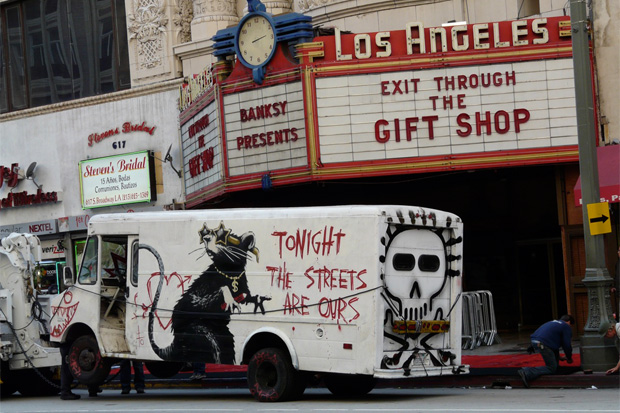
Farewell Atlantis.

Haunting the Web Since 1999

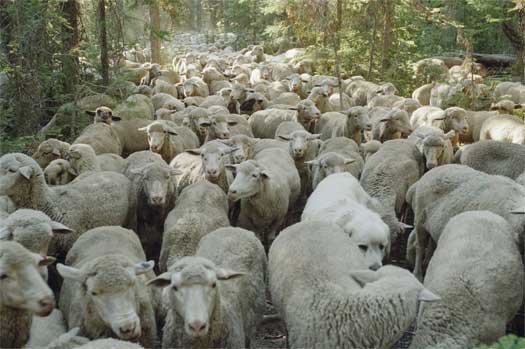
And so on. Judging from the generally positive reviews, I went into Lucien Castaing-Taylor’s pretty but painfully slow sheepherding documentary Sweetgrass expecting a languid, contemplative rumination on the ancient but fading bonds between Man and Beast. And I guess that’s basically what I got. But, at the risk of seeming like a Philistine, trust me: You really can’t overestimate how slow-moving this picture turns out to be. Sweetgrass has images of undeniable beauty, sure, but I thought its reach far exceeded its grasp. And, while obviously different movies work for different people, some of the ridiculous praise Sweetgrass is getting — “the first essential movie of this young year,” for example (Manohla Dargis, NYT) — has a definite “Emperor’s New Clothes” feel to it.
Billed as “the last ride of the American cowboy” (as in Brokeback Mountain, by cowboy they mean sheepherder), Sweetgrass chronicles the final time a flock was taken into Montana’s Absaroka-Beartooth mountains for summer pasture on a federal grazing permit, in 2001. It seems like an arduous undertaking, and no mistake — Two men have to corral hundreds of sheep on a journey through forests, across creeks, and up and down steep mountainsides, with only some horses and a few dogs to help them. (Speaking of which, I imagine Berk would’ve loved this flick.) But, just because a job is hard doesn’t necessarily make it compelling for motion picture purposes. And, as a film, Sweetgrass loses the thread in them there hills.
The movie works best in its opening half-hour or so, when the long, uninterrupted takes of sheep and shepherd behavior still seem like a novelty. The herd is shorn, the herd is fed (from a big wheel of grass, basically), the herd reproduces, the herd is driven through the streets of a small town to start its great grazing adventure. All pretty interesting. But, once Swetgrass gets into the actual drive into the mountains, we’re already pretty much inured to strange sheep behavior and the crazy fluid dynamics of the herd, and there’s not enough other story to sustain the enterprise. So after awhile, you just sit there, waiting for something — anything! — to happen: Demon sheep? Killer sheep? Even just a Black Sheep, maybe? Nope, sorry. Instead, we sit through extended shots like “Sheep being Sheep,” “Man Getting on Horse,” “Man Setting Up Tent,” “Sheep Still Being Sheep,” “Man Eating Bacon,” “Sheep Even Still, Not Surprisingly, Being Sheep,” and “Man Complaining about Sheep Being Sheep.” (Yes, I was reminded of this Onion classic.) There’s not much there there.
I say “Man” because, in a Cormac McCarthy-esque flourish, the film never really introduces us to the two shepherds on this drive. Presumably, this was to add to the “ancient natural rhythms” feel of the film — man, dog, horse, and sheep engaged in a millennia-old ritual or somesuch. The problem is, neither of this pair are engaging or particuarly easy to relate to. (Earlier, a sheephand at the farm gets off a good joke about “cowboy brains,” but unfortunately he’s not on the Big Trip.) The elder fella on the drive has a certain whos-more-grizzled je-ne-said-quoi, I guess, but he’s a mumbler with a maddening tendency to repeat himself over and over and over again. (Did I mention he repeats himself? He repeats himself.) And the other guy, who gets less screen time, probably ends being even worse to hang around with. At one point late in the film, he throws what can only be called an epic hissy fit — screaming vulgarities at sheep and calling his mom to whine about his predicament. I get it, it sucks. You’re still on camera, buddy.
Speaking of getting it, I know what the counterargument to my dismissal here is — As the Boston Globe‘s Ty Burr puts it, Sweetgrass is arguably “about the death of a particular sense of time: slow, profoundly observant, in tune with the larger cycles of nature…If you’re used to the ADD pace of modern filmmaking, ‘Sweetgrass’ will probably drive you crazy. If you can adjust, it could widen your soul.” Well, ok, I plead guilty to ordinarily being a souped-up, Twitter-happy, multi-tasking, Red Bull achiever. And, when it comes to spending my entertainment dollar on discourses about the Death-of-the-West, I highly prefer Red Dead Redemption (or, for that matter, books like Richard White’s It’s Your Misfortune and None of My Own) to plodding docs like this. But I also feel like I have a higher-than-normal curiosity about the world, and I don’t think I have the attention span of a hummingbird either. And, despite my best efforts, I was just not feeling this film. To be honest, some of this “you can’t handle a slower rhythm” talk feels like an attempt to make Sweetgrass critic-proof.
As it is, Sweetgrass would’ve probably made for a great one-hour National Geographic documentary or an episode of Dirty Jobs. And, as a “thick-description” anthropological study of a sheep drive, it probably has its merits too. But, as a full-length movie, though, it leaves much to be desired. On the bright side, its glacial pace and studied solemnity actually sent me into 21 Grams-style chuckling fits after awhile, and everyone in the theater got a good laugh at the sheephands onscreen snoring in unison with the guy in the front row. Counting sheep, indeed.

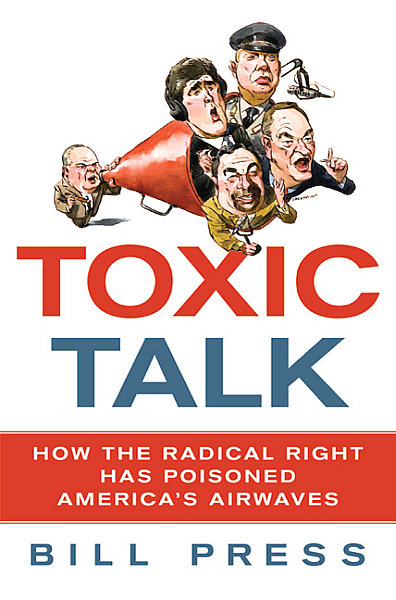 “Ever since 1987 and the end of the Fairness Doctrine, which freed station owners from having to provide any balance on the air, conservatives have dominated talk radio. To the point where today, according to a 2007 report of the Center for American Progress, there are at least 10 hours of right-wing talk for every one hour of progressive talk. And that’s a real problem. Not simply because this torrent of hate is unpleasant for most people to listen to. But because it also debases the level of political discourse in this country, at a time when we need it the most.“
“Ever since 1987 and the end of the Fairness Doctrine, which freed station owners from having to provide any balance on the air, conservatives have dominated talk radio. To the point where today, according to a 2007 report of the Center for American Progress, there are at least 10 hours of right-wing talk for every one hour of progressive talk. And that’s a real problem. Not simply because this torrent of hate is unpleasant for most people to listen to. But because it also debases the level of political discourse in this country, at a time when we need it the most.“
Personal plug: Bill Press’ Toxic Talk: How the Radical Right Has Poisoned America’s Airwaves, which I worked on in a research and editing capacity last year, is hitting bookstores today. (As longtime readers may remember, this is our fifth book together, along with Spin This (2001), Bush Must Go (2004), How the Republicans Stole Christmas (2005), and Trainwreck (2008).) In any case, I suspect regular readers here — all ten of you! — should be sympathetic to its central thesis: Right-wing talk radio is bad for our politics and for our country. (And hat-tip to Media Matters, a key resource for this book, for watchdogging these blustery carnival barkers on a full-time basis.)
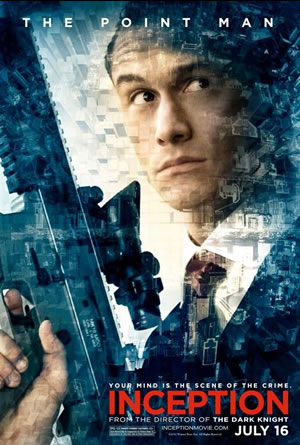
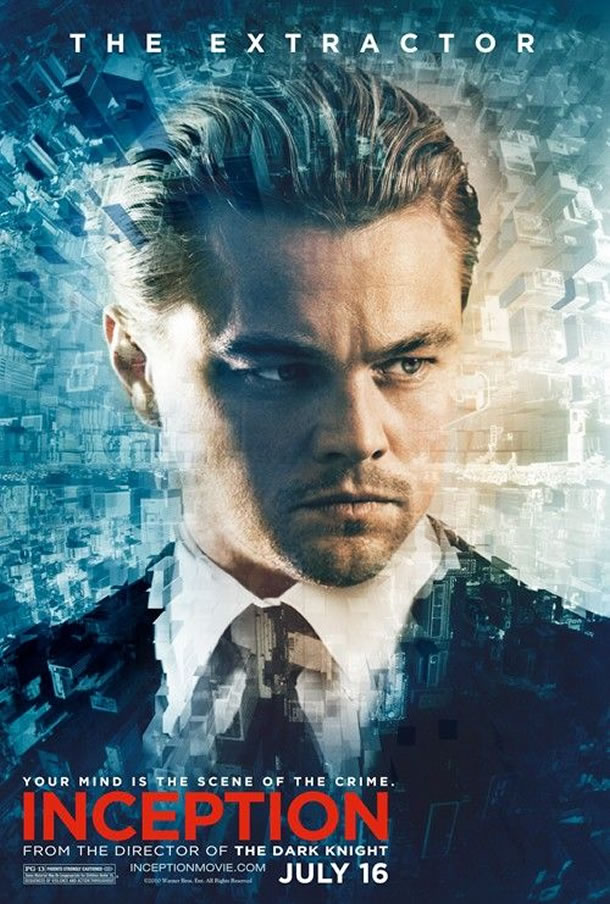

“I’ve been using a pre-release version of the service for a couple of weeks now, and I’m a huge fan. The new Hotmail is fast, well-designed, and adds a host of features that bring it up to par with other e-mail services, including Gmail. Indeed, it has several features that I wish Gmail included.” Slate‘s Farhad Manjoo previews the coming Hotmail overhaul. As someone who’s stuck around the old home even as all the cool kids flocked to gmail (which I use for listserv e-mails), I’m definitely looking forward to it.
“The bottom line is this: Current procedures under the CSRT are such that a perfectly innocent individual could be held and could not rebut the Government’s case and has no way of proving his innocence. I would like somebody in this Chamber, somebody in this Government, to tell me why this is necessary.” Me too, Senator Obama, me too.
In a decisive break with his campaign stances and the best indicator yet that this administration is now happily perpetuating deeply troubling Bush-era policies, the President wins the right to hold detainees indefinitely in Bagram — the difference from the Boumediene decision on Gitmo being that Bagram is a “war zone.” (And Ben Franklin’s admonition aside, that’s an excuse you hear quite a bit these days.)
FWIW, Politico’s Josh Gerstein — while bending over backwards, as per the Village norm, not to call torture “torture” — suggests civil liberties concerns are overblown here, but check out his reasoning: “The Obama administration…has, so far, resisted seeking a full-scale preventive detention law that would apply to future captives. Instead, it has pleaded with civil liberties and human rights groups not to oppose some legal mechanism to allow the continued detention of Al Qaeda captives, at least some of whom may be untriable because of aggressive interrogations many view as torture.“
Oh, please. We have to hold them forever because we tortured them? How utterly and completely effed up is that? As Stephen Colbert well put it: “It’s essentially the same stance taken by George Bush. With one important difference: Obama makes the kids like it.”
With a word of warning from The Prospect‘s Paul Waldman, Popular Science takes a gander at Boston Dynamics’ LittleDog. “LittleDog doesn’t just traverse the terrain; it learns as it goes, noting what works and what doesn’t and incorporating that knowledge into its foothold scoring system.“
“‘Mass Effect is a tremendous property ripe for translation to the big screen,’ said Thomas Tull, Chairman and CEO of Legendary Pictures. ‘Mass Effect is a prime example of the kind of source material we at Legendary like to develop; it has depth, compelling characters and an engaging back story.’” In probably inevitable news, Mass Effect is coming to the big screen, with a script by Mark Protosevich (I am Legend, Thor.) Eh, I’d be happier just to see an earlier release of Mass Effect III.
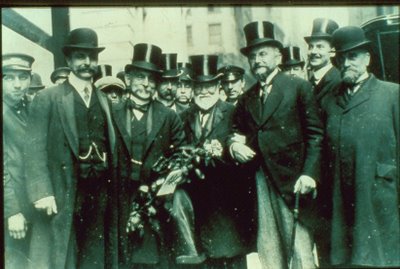
In the wake of the Senate’s 59-39 passage of financial reform last week (not to mention increasing evidence of rampant and pervasive fraud at Goldman, Morgan, and elsewhere), New York‘s John Heilemann surveys the bruised egos of Wall Street’s would-be robber barons. (In very related news, Paul Krugman and the WP note that Wall Street is now betting heavily on the GOP again.)
Keep in mind: Wall Street is angry with the administration despite the fact that “Geithner’s team spent much of its time during the debate over the Senate bill helping…kill off or modify amendments being offered by more-progressive Democrats.” [Change we can believe in!] Heilemann writes: “Whatever the effects of the bill, among them will be neither an end to the too-big-too-fail doctrine nor any curb on what the sharpest Wall Streeters see as the central threat to the system’s stability: excessive financial leverage. Geithner, Summers, and Obama had little interest in tackling those matters, not because they are indentured servants to Wall Street but because at heart they are all technocrats who believe the system doesn’t need to be rebooted or downsized, merely better supervised.“
Still, on the bright side and despite the ambivalence (or open opposition) from folks in high places, this bill did get significantly stronger on the Senate floor, and in some ways is now stronger than the House version passed last year. Let’s hope this welcome progressive trend continues in conference.

Ostensibly a documentary about the world of street art in the post-graffiti era, as well as the found story of an artist of dubious talent’s meteoric rise to stardom, Exit Through the Gift Shop, as the name implies, is also a complicated and funny disquisition about the overlapping and almost impossible-to-disentangle spheres of art, commerce, money, and popular taste. Given’s Banksy’s statement on the second day of his 2007 Sotheby’s auction — “I can’t believe you morons actually buy this s**t” — there seems a very solid chance that Gift Shop is a well-crafted put-on. (Is he ‘aving a laff?) Whether he is or he isn’t, Exit is a pretty fun ride, and it definitely gives you an urge to get out there and create something.
Narrated throughout by Rhys Ifans, our story begins with one Thierry Guetta, a French shopowner and family man living in Los Angeles. Thierry, it seems, is one of those possibly-genius, more-likely-just-plain-crazy strange birds that tend to gravitate toward the City of Angels. His particular inflection of weirdness: He starts carrying around a video camera with him everywhere he goes — work, home, the bathroom, the streets, you name it. He doesn’t watch any of the tapes, mind you — he just records them. Having lost his mother at a young age, Thierry is now obsessed with capturing ever single iota of his existence on film, so no moment is ever again lost…like… tears…in rain.
As you can imagine, this constant filming drives everyone around Thierry to the point of distraction. But his hobby gains focus when, on a trip to Paris, he discovers his cousin is the one-and-only Invader, a street artist filling Paris and the world over with Space Invader mosaics. His interest piqued, Thierry soon plunges head-first into this hidden world of expressive ne’er-do-wells and hit-and-run artistry, thanks to a connection made through his cousin: the now-famous Shepherd Fairey. (As an aside, Fairey hails from Charleston, SC, not-so-far down the road from where I grew up, and I and a goodly part of my high-school class spent most of 1992 and 1993 festooning the Palmetto State with his Andre the Giant stickers.)
And so Thierry becomes the video chronicler of an underground movement (or the video recorder, at least — the tapes just pile up in boxes at his house.) But his menagerie of street artists is missing the prize catch: Banksy, the wily, witty British stencil artist known for elaborate stunts like painting up both sides of the West Bank Wall. Having a secret identity and all, Banksy is a hard man to track down, but the obsessive Thierry is not one to be deterred. So, when Banksy comes to town to do some work (and put on a show), Fairey makes an introduction. Indeed, Thierry even manages to gain the reclusive artist’s trust after helping put a Gitmo detainee in Disneyland, and the rest is history.
Ah, but our story is not over yet. Y’see, Banksy finds out about all the tapes, and asks to see Thierry’s movie. Thierry…isn’t so good at making movies. So, while Banksy culls through hours and hours of raw material, he suggests Thierry go have some fun, maybe make some art somewhere. This poses a new challenge for our OCD hero, and Thierry — now remonikered Mr. Brainwash (MBW) — takes it on his inimitable fashion. The result: A ginormous art show in LA entitled “Life is Beautiful”, teeming over with crappy, lowest-common-denominator pop-art that is half-Warhol, half-Banksy, and pretty much all sloppy and derivative. And, as sure as spring follows winter, people love it, Mr. Brainwash is everyone’s favorite new flavor, and Madonna commissions him for an album cover. Wow, this being a street artist thing is easy!
Or is it? It’s an open question whether Mr. Brainwash is another elaborate Banksy hoax, and if I had to bet on it, I’m thinking — despite Shepard Fairey’s protestations — the fix is in. (We never actually see him create anything, and, while I don’t think he himself is Banksy, there’s a reason Thierry looks so much like Tony Clifton.)
But, in the end, as one of Banksy’s co-conspirators says in Gift Shop, who’s the joke on? Mr. Brainwash is now a millionaire, and a lot of people spent a lot of money on his mostly uninspired and pedestrian works. But, you know, they seem to like them…so what does that tell us about what constitutes good art in the first place? Banksy never breaks character or show his cards here — He just lets the story play out and lets you think what you want. And say what you will about Banksy and his possible protege, they earned my $10 with this merry, subversive eff-you to the art world, the Sotheby’s crowd and any would-be arbiters of artistic taste. If it is a grift, and I think it probably is, Exit Through the Gift Shop is nonetheless an open-ended and very enjoyable one.
